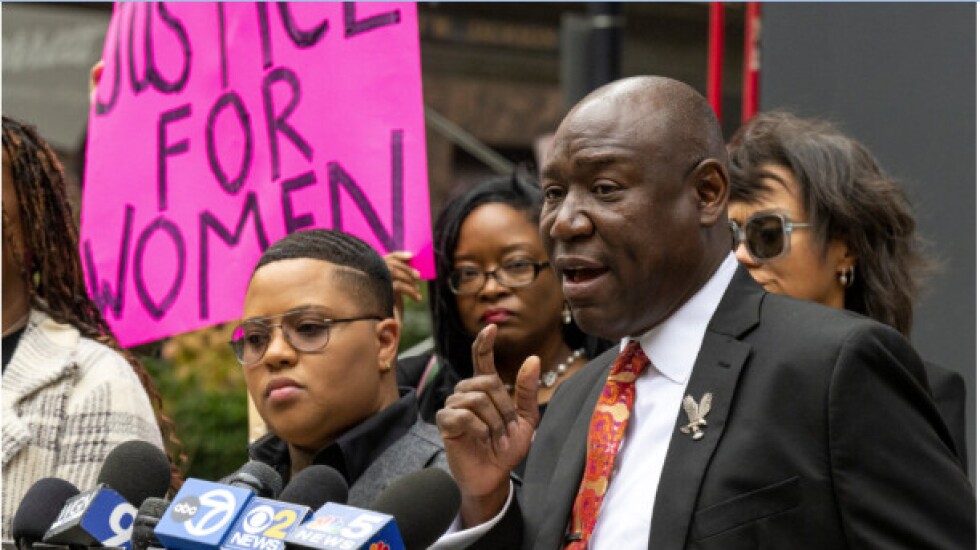
Now the Northwestern football hazing mess gets messier.
This is how it goes, folks. This is big-time college sport. This is how it rolls.
If you think the locker-room ‘‘dry-humping’’ scandal that already has cost head coach Pat Fitzgerald his job is a rare breach of some virtuous corner of our higher-education system in America, think again.
This, my friends, is us.
This is revenue-producing, age-group, booster-crazed, spectator-friendly collegiate sport at its inevitable bottom. A bottom — by the way — that happens all the time.
Northwestern’s baseball coach already has been fired for bullying and abusive behavior. (How did he step into this football pile?) Fitzgerald himself has hired heavyweight counsel Dan Webb to sue for the $40 million-plus left on his contract and perhaps some apology from somebody.
On Monday, eight former Northwestern football players eyeing legal action signed on with attorney Ben Crump, the noted civil-rights lawyer and the man who has been referred to as ‘‘Black America’s attorney general.’’ Crump has handled cases involving Trayvon Martin, Michael Brown, George Floyd, Tyre Nichols, Ahmaud Arbery, Jacob Blake, even Malcolm X. I’m guessing you’ve heard of a few of them. So nobody is walking away from this scandal without more stuff hitting the fan.
We should mention billionaire, mega-donor alum Pat Ryan, who is the main driver of the $800 million renovation of the football stadium that now seems stalled. Ryan has some skin in this. As we know, mega-donors help pick trustees, coaches and presidents.
In the middle of this rock fight sit overmatched, mystified and likely horrified university president Michael Schill and athletic director Derrick Gragg. There are the many faculty members who are aghast and demanding explanations and reform. Plus, there are actual Northwestern football players ready to transfer, high school seniors decommitting, bad PR everywhere.
But here’s the thing: If you enter what is called by those involved the ‘‘arms race’’ of big-time Division I sport, you willingly have entered into the belly of the beast. And it’s dark in there.
The Carnegie Report of 1929; the U.S. Department of Education’s ‘‘Light and Shadows on College Athletes’’ report of 1990; the Knight Foundation Commission on Intercollegiate Athletics reports of 1991, 1992, 1993; former longtime NCAA leader Walter Byers’ 1995 expose and mea culpa, ‘‘Unsportsmanlike Conduct: Exploiting College Athletes’’ — all these stories end up with the same conclusion: Big-time college sport is dubious, exploitative and often immoral. And it has nothing to do with academics.
Take late University of Chicago author and Divinity School dean Shailer Mathews’ damning statement: ‘‘Football today is a social obsession — a boy-killing, education-prostituting, gladiatorial sport.’’ He said that in 1905.
Northwestern, an outstanding educational school, has been down this jogging path before. There was the gambling and point-shaving scandal that occurred in 1994-95 in the football and basketball teams — the only time any NCAA school has had such offenses in two sports in the same year. There was Rashidi Wheeler’s death in an illegal offseason football practice in 2001 (settled for $16 million). There was the NU women’s soccer hazing scandal that got the team suspended in 2006.
And there’s the ongoing cheerleader sexual-harassment lawsuit from 2021, including the debacle of a recently hired athletic director who quickly resigned because he was named in that suit.
These messes are painful, but they always go away, and the big-time schools march ever onward toward athletic dominance. Of course, that dominance seldom comes, except for the select few. But the quest never ends.
Back in 2017, there was a football hazing scandal at Wheaton College, an evangelical school that should have taught its players better. Five players were charged with felonies, which were reduced to misdemeanors, and the defendants eventually did their penance, the school paid out money to the abused player and the problem drifted away.
Two people I know handled the case. My relative Brian Telander was the DuPage County judge in charge, and a former Northwestern football teammate of mine, Terry Ekl, represented the plaintiff. Both men are top-drawer, smart and decent professionals.
I asked each for their thoughts about the case.
‘‘These kinds of cases are very difficult for the judge and the attorneys on both sides because the defendants are usually without criminal histories and have no idea of the consequences,’’ Telander said.
Said Ekl, who agreed to the reduced charges against the culprits: ‘‘It’s hard to put ‘one size fits all’ in these resolutions. We all did crazy stuff in college.’’
We likely did. And then the real world intrudes.







